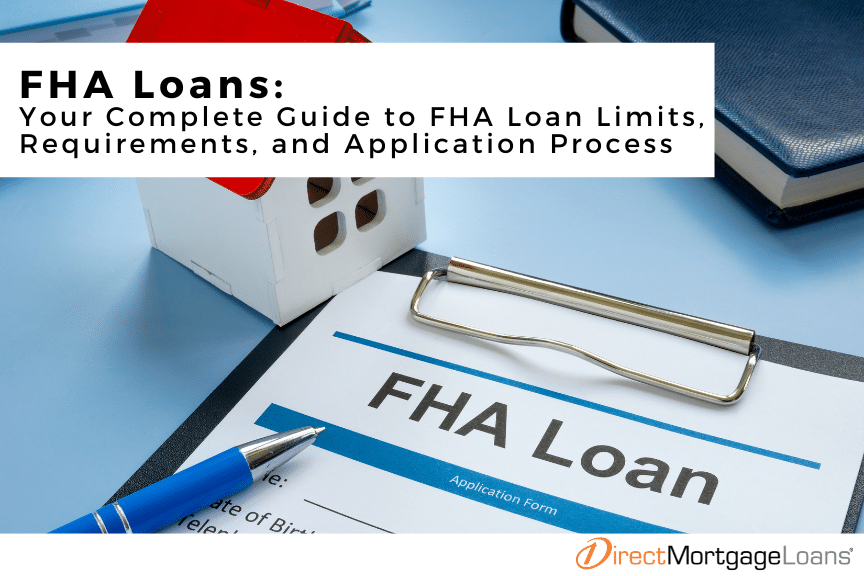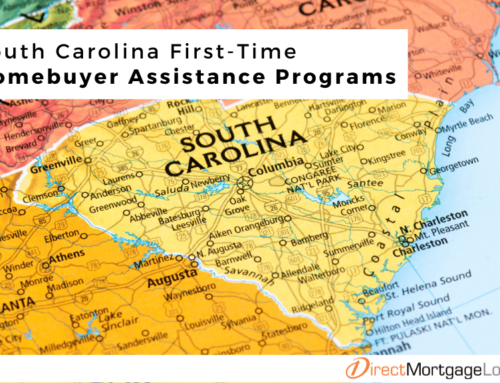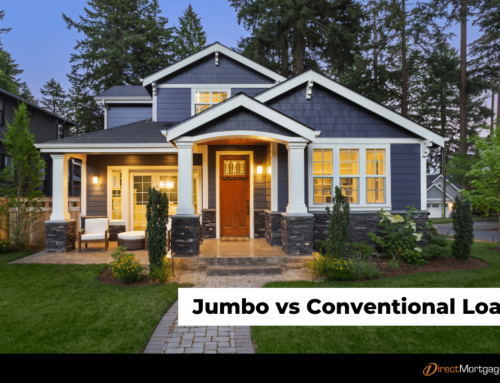Are you considering a home purchase? If so, then an FHA loan might be for you. This guide will provide you with all the FHA loan information you need, including what FHA loans are and how they work, the requirements, loan limits, and application process.
Subscribe to our blog to receive notifications of posts that interest you!
What Is A FHA Loan?
If you’re looking to buy a home but have limited funds for a down payment or a lower credit score, then an FHA loan might be a good option for you. This is a type of mortgage insured by the Federal Housing Administration (FHA), which allows lenders to be more flexible with their requirements for borrowers who may not meet traditional criteria. These loans are commonly used by first-time homebuyers and can have either a fixed or adjustable interest rate.
How do FHA loans work?
FHA loans are a government-backed program which makes homeownership more accessible through more lenient lending requirements. With an FHA loan, a borrower could put down as little as 3.5% if their credit score is at least 580, or 10% if their credit score is at least 500. Nevertheless, there is a trade-off; regardless of the amount you put down, there is a requirement to pay for mortgage insurance.
The FHA collects a one-time upfront mortgage insurance premium (UFMIP). This premium needs to be entirely financed into the mortgage or paid in full at closing. Additionally, there is an annual mortgage insurance premium, also called monthly MIP, which is collected in monthly installments.
The annual mortgage insurance amount depends on factors such as the loan-to-value ratio (LTV), down payment size, and mortgage term length. Lenders calculate the annual payment as a percentage of the base loan value.
Benefits Of FHA Loan
There are several key benefits that make FHA loans an attractive option. Here are a few of the benefits:
- Low Down Payments: FHA loans are designed to help borrowers with limited funds for down payments. Specifically, if your credit score is above 580, you could qualify for a down payment of 3.5%.
- Flexible Credit Requirements: FHA loans have lower credit score requirements compared to conventional loans. Even with a credit score as low as 500, you may qualify with a 10% down payment.
- Lower Debt-to-Income Ratio (DTI): Compared to conventional loans, FHA loans typically allow borrowers with higher levels of debt to still qualify by allowing a higher Debt-to-Income Ratio (DTI).
- Gift Funds and Grants: You could leverage gift funds and grants from family or approved organizations to contribute towards your down payment.
FHA Loan Requirements
To be eligible for an FHA loan there are some specific requirements you must meet. Here is an overview of these requirements:
FHA Loan Down Payment
The amount you’ll need to pay as a down payment on an FHA loan depends on your credit score. If your credit score is 580 or higher, then you could pay as little as 3.5% of the loan amount. However, if your credit score falls between 500 and 579, you’ll need to pay a larger down payment of 10%. If you’re short on funds, there are several DPA programs available which could help!
FHA Mortgage Insurance Premiums
All FHA borrowers, no matter how much of a down payment they make, must purchase both upfront and annual mortgage insurance.
What does FHA mortgage insurance cover?
FHA mortgage insurance protects lenders in case you, the borrower, default on your mortgage. This allows lenders to offer FHA loans with lower down payments and potentially less strict credit score requirements. Essentially, it mitigates the lender’s risk, making FHA loans more accessible to first-time homebuyers or those with limited savings.
How much is FHA mortgage insurance?
FHA mortgage insurance has two components – an upfront premium and an annual premium. The upfront premium is a one-time payment that you need to make at the time of loan closing, and it amounts to 1.75% of the loan amount.
On the other hand, the annual premium is a recurring cost that you need to pay as a part of your monthly mortgage payment. The amount of the annual premium may vary depending on factors such as the loan term, loan amount, and loan-to-value ratio (LTV).
Oftentimes, with credit improvement and an increase in home equity (at least 80% loan-to-value), borrowers with FHA loans opt to refinance to a conventional loan program. This helps eliminate the monthly mortgage insurance premium portion of the monthly mortgage payment.
How To Calculate FHA Mortgage Insurance
To calculate your FHA Mortgage Insurance, you can either use the HUD Calculator or follow these simple steps using your specific information:
- Determine the amount of your loan.
- Calculate your loan-to-value (LTV) ratio by dividing the loan amount by the appraised value of the home.
- Find the annual MIP rate based on your LTV ratio and loan term. You can find this information on the HUD website or ask your lender for it.
- Multiply the loan amount by the annual MIP rate to get the annual MIP amount.
Your Direct Mortgage Loans loan officer can also calculate this for you.
Can I remove FHA mortgage insurance?
If you have an FHA loan, you can’t remove the Mortgage Insurance Premium (MIP) as easily as you can with Private Mortgage Insurance (PMI). To remove MIP from your FHA loan, you could refinance into a Conventional Loan. Once your home has at least 20% equity, you typically won’t have to pay PMI with a conventional loan.
FHA Minimum Credit Score
Flexible qualifying credit makes these types of home loans a popular option for those with lower credit scores. To qualify for an FHA loan, your FICO credit score needs to be at least 580. In rare circumstances Direct Mortgage Loans does have the capability to lend below 580, but the borrower must have strong compensating factors (i.e. DTI and reserve amounts).
FHA DTI
Your debt-to-income ratio is the percentage of your gross income used to cover your mortgage and other debt payments. The preferred DTI ratio for FHA loans is 43% although this may vary based on your credit score and may go up to 57%.
Calculating Your DTI
To calculate your Debt-to-Income Ratio (DTI) you could either use our mortgage calculator or follow these simple steps:
- Add up all your monthly debt payments, including car loans, student loans, credit card debt, and the estimated monthly mortgage payment for the FHA loan you are considering.
- Calculate your pre-tax gross monthly income.
- Once you have these numbers, use the following formula to calculate your DTI Ratio: DTI Ratio = Total Monthly Debt Payments / Gross Monthly Income.
FHA Loan Income Requirements
FHA loans don’t have any specific minimum or maximum income requirements. However, you need to demonstrate that your income is consistent and reliable enough to make mortgage payments for the life of the loan. To do so, you will need to provide proof of your income with paystubs and tax returns.
FHA Loan Limits
The maximum amount you can borrow on an FHA loan (which is set by The Federal Housing Administration) is $472,030 in most areas. For FHA borrowers in high-cost areas, the maximum loan limit for a 1- unit property in a high-cost county is $1,089,300. Special exception, loan limits in Alaska, Hawaii, Gaum, and the U.S. Virgin Islands cap single-family home loans at $1,633,950.
FHA Mortgage Rates
FHA loans typically have lower interest rates than conventional loans. This is because the Federal Housing Administration (FHA), which manages the FHA loan program, insures these mortgages. This insurance protects private lenders from the risk of borrower default, which enables them to offer lower rates. However, your interest rate depends on your specific financial situation, including your credit score, debt-to-income ratio (DTI), and down payment.
Types Of FHA Loans
There are different types of FHA loans available, each with unique requirements and benefits. Here are some of the most common options.
Home Purchase
FHA loans are commonly used to finance the purchase of a single-family house, townhouse, or condominium. It is an ideal option for first-time homebuyers because of its lower down payment requirements and credit score criteria.
FHA Rate Term Refinance
A FHA Rate Term Refinance enables you to refinance your current FHA loan and potentially obtain a lower interest rate or adjust the loan term. This could lead to significant monthly savings which could help you pay off your mortgage sooner.
FHA Streamline
The FHA Streamline option allows refinancing without an appraisal, providing a fast and simple process for borrowers with existing FHA-insured mortgages.
FHA Cash Out Refinance
An FHA Cash Out Refinance allows you to leverage the equity you’ve built up in your home by converting it to cash. You can access additional funds to consolidate debt, finance home improvements, or address other financial needs.
FHA 203k
These loans cater to homebuyers interested in purchasing a fixer upper. FHA 203k loans combine financing for both the purchase and renovation of a property, allowing you to roll renovation costs into your mortgage payment. This eliminates the need for a separate renovation loan, simplifying the financing process.
FHA 100% Financing
This program provides homebuyers with 100% financing for FHA loans, without requiring a down payment (closing costs are still required). This is achieved through a combination of a 1st and 2nd mortgage.
This DPA program can be used to obtain an FHA loan. The 2nd mortgage can be up to 3.5% of the sales price or the appraised value, whichever is less. The term for the 2nd mortgage is 10 years.
FHA vs Conventional Loan
FHA and conventional loans are two popular options for financing a home. Nevertheless, there are some key differences between the two which you should know about.
FHA loans are provided by lenders approved by the Federal Housing Administration and guaranteed by the government. These loans usually have more relaxed eligibility requirements compared to conventional loans, and FHA loans may require smaller down payments. However, you will need to pay mortgage insurance premiums (MIPs) for at least 11 years, or the full term of the loan.
On the other hand, conventional loans are not backed by any government agency and may have stricter lending standards. They may require larger down payments than FHA loans, and if you provide less than 20% as a down payment, you will have to pay for private mortgage insurance (PMI). However, you can request to cancel PMI when your balance reaches 80% of the original home value.
How To Apply For A FHA Loan
Thinking about applying for an FHA loan? Here’s everything you need to know to get started.
Find an approved- FHA Lender
To apply for an FHA loan, first find a lender who offers this type of loan. Not all mortgage lenders provide FHA mortgages, so it’s important to research and find one that does. Direct Mortgage Loans is an approved FHA lender and could assist with the home financing process.
Gather Your Documents
Before submitting your application, gather the necessary documents to verify your income, employment history, assets, and debts. Typically pay stubs, tax returns, W-2s, bank statements, and investment account statements are required.
Submit a Pre Approval Application
The next step is to submit a pre-approval application. This step requires you to provide your personal information, financial documents, and authorization for a credit check. Your lender will assess your credit score and history, along with your income and debt-to-income ratio (DTI).
How can I find FHA lenders near me?
To find an FHA lender near you, use the HUD Lender List Search tool to locate an approved lender located near your area. Alternatively, you can also speak to one of our loan officers at Direct Mortgage Loans, since we are an FHA-approved lender. Don’t hesitate to get in touch with us today!
FHA Loan FAQ’s
Are FHA loans good?
An FHA Loan could be a good option for first-time home buyers of those with limited funds for a down payment and a lower credit score. Nevertheless, there are also some drawbacks to consider as well like private mortgage insurance. It’s best to consider your specific situation and contact a Loan Officer to determine if this loan option is a good choice for you.
Who qualifies for FHA loans?
To qualify for an FHA loan, you must have a minimum credit score of 580 if you plan to put down 3.5% of the loan. However, if your credit score ranges between 500 to 579, you will need to put down 10% of the loan. Your debt-to-income ratio should also not exceed 43%, indicating that you have a balance of income and debts owed. To demonstrate your ability to make payments, you must also have proof of stable income and employment.
Furthermore, it’s important to keep in mind that lenders may have additional requirements you need to fulfill. Therefore, speak to a Loan Officer to discuss your specific situation and eligibility.
How can I find FHA approved homes for sale near me?
If you’re looking for a house that is approved for FHA loans, then you can use the HUD website to find one. Additionally, you can work with a licensed real estate agent who knows your local market and can search for FHA-approved homes that match your specific requirements and preferences.
How many FHA loans can you have?
Since these loans are designed to promote homeownership for primary residences, you can only have one FHA loan at a time. This rule helps ensure the program’s accessibility for first-time homebuyers, and the program’s flexible requirements are not taken advantage of.
Can you buy a duplex with an FHA loan?
FHA loans are a great way to finance the purchase of a duplex. Remember, you must live in one of the units as your primary residence for at least one year in order to be eligible for an FHA loan. This requirement is in place because FHA loans are intended to help people buy homes they will live in, not as investment home opportunities. Buying a duplex allows you to earn rental income while also enjoying the experience of being a homeowner.
Can you get an FHA loan twice?
You could qualify for an FHA loan twice, although you can only have one active FHA loan at a time. It’s like trading in your old car for a new one. You can only finance one car at a time, but you can purchase multiple cars throughout your life. The FHA program aims to help people become homeowners, so you can use the program again after you’ve paid off your first FHA loan and moved into a different primary residence.
Are FHA loans assumable?
FHA loans offer the benefit of being assumable, which means the buyer could take over the seller’s existing loan instead of obtaining a new one. This could result in lower monthly payments and save you money in the long run. Keep in mind there are specific requirements for both the buyer and the seller for this scenario to work out.






Leave A Comment
You must be logged in to post a comment.